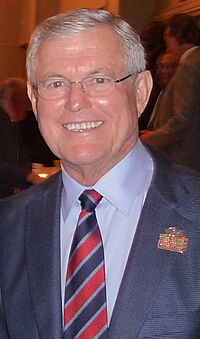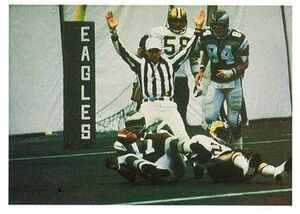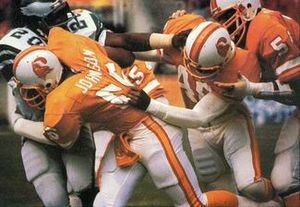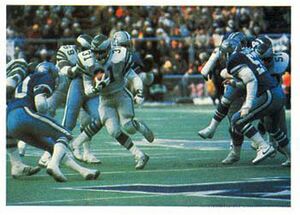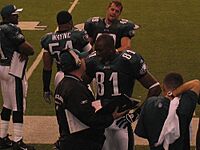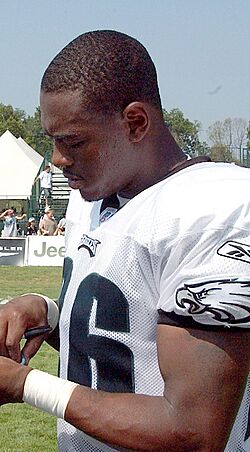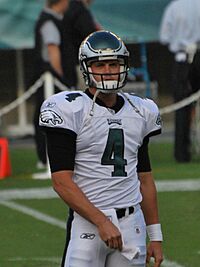History of the Philadelphia Eagles facts for kids
The Philadelphia Eagles are a professional American football team based in Philadelphia, Pennsylvania. They are part of the NFL. The team started in 1933. The Eagles have played in the Super Bowl four times. They won Super Bowl LII in 2018, which was their first Super Bowl victory. They also won four out of five NFL Championships before the Super Bowl era.
The early years of the Eagles, from 1933 to 1939, were shaped by their owner and coach, Bert Bell. After Bell sold the team in 1940, the next period was largely led by coach Greasy Neale, who later became a Hall of Famer.
Contents
- How It All Started (1933–1943)
- Winning Seasons (1944–1949)
- Ups and Downs (1950–1959)
- The 1960s: A Championship and Changes
- From Struggling to Hopeful (1970–1979)
- Success in the 1980s (1980–1990)
- New Coaches and Challenges (1991–1998)
- The Andy Reid Years (1999–2012)
- The Chip Kelly Era (2013–2015)
- The Doug Pederson Era (2016–2020)
- A New Era (2021-present)
- Images for kids
How It All Started (1933–1943)
Forming the Team and Early Years
In 1931, Philadelphia's first NFL team, the Frankford Yellow Jackets, went out of business. After more than a year, the NFL allowed a new team to start. This team was led by former college friends Lud Wray and Bert Bell.
They paid $2,500 to get the rights to the old Yellow Jackets team. Bell and Wray named the new team the Philadelphia Eagles. They were inspired by the "Blue Eagle" symbol from President Franklin D. Roosevelt's New Deal. Bell became the president and general manager, and Wray was the head coach. The Eagles do not claim the Yellow Jackets' history as their own.
The new Eagles team played their first game on October 15, 1933. They played against the New York Giants in New York City. They lost that game 56–0. The Eagles struggled a lot during their first ten years.
In 1935, Bert Bell suggested a new idea: the annual college draft. This was meant to help all teams get good players. Before this, a few teams like the Chicago Bears, Green Bay Packers, and New York Giants won almost every championship. The draft allowed teams to pick players in reverse order of how they finished last season. This meant the worst teams got the first chance at the best new college players. This idea is still used today and helps keep the league exciting.
Coach Bell Takes Over (1936–1939)
Since the Eagles finished last, they had the first pick in the 1936 draft. They chose Heisman Trophy winner Jay Berwanger. However, Berwanger decided to go to medical school instead of playing professional football. The Eagles traded his rights to the Chicago Bears.
The Eagles had their first big player success in 1939. They signed All-American quarterback Davey O'Brien. O'Brien broke many NFL passing records in his first year. That year, the Eagles played in the first ever televised football game. They lost to the Brooklyn Dodgers 23–14.
Team Changes (1940–1942)
In 1940, the team moved to Shibe Park. The Eagles' owner, Lud Wray, sold his share to Art Rooney. Rooney had just sold his Pittsburgh Steelers team. Then, the Eagles' and Steelers' owners swapped franchises. This meant the Eagles' team moved to Pittsburgh, and the Steelers' team moved to Philadelphia. Only the team names stayed in their original cities. After this, Thompson became the Eagles' owner and hired Greasy Neale as the new head coach.
The Steagles (1943)
In 1943, many football players joined the military for World War II. This caused a shortage of players for NFL teams. To have enough players, the Eagles and the Steelers temporarily joined together. They formed a team unofficially called "The Steagles". This merger ended after the season.
Winning Seasons (1944–1949)
In 1944, the Eagles drafted Hall of Fame running back Steve Van Buren. With Van Buren and coach Neale, the Eagles became a strong team. They had their first winning season as a separate team in 1944.
After finishing second in 1945 and 1946, the Eagles reached the NFL title game for the first time in 1947. They lost to the Chicago Cardinals 28–21. The Eagles played the Cardinals again in the 1948 championship and won 7–0. Then, the Eagles made it to the NFL championship game for a third year in a row. They won against the Los Angeles Rams 14–0.
In Thompson's last draft, Chuck Bednarik was chosen as the first player overall in the 1949 NFL Draft. Bednarik was a great lineman and linebacker from the University of Pennsylvania. He became one of the most famous and loved players in Eagles history. In 1949, Thompson sold the team to a group of 100 buyers called the "Happy Hundred". Each person paid $3,000 for their share. James P. Clark led this group, and Leonard Tose was also an investor who later became the owner.
Ups and Downs (1950–1959)
The 1950s brought changes for the team. The Eagles were expected to easily beat the AAFC champion Cleveland Browns in their first game of the 1950 season. But the Browns surprised everyone, winning 35–10. The Eagles finished the season with a 6–6 record.
Coach Neale retired after the season. The team struggled for most of the 1950s. However, in 1958, the team started to improve. They hired Buck Shaw as head coach and got Norm Van Brocklin in a trade with the Los Angeles Rams. That year, the team also moved from Connie Mack Stadium to Franklin Field, which doubled their attendance. The 1959 team finished second in their division.
The 1960s: A Championship and Changes
1960: A Historic Win
1960 is a very special year for the Eagles. Coach Shaw, Van Brocklin, and Chuck Bednarik (all in their last season before retiring) led the team to its first division title since 1949. The team was known for being tough and determined. They had two great receivers, Tommy McDonald and Pete Retzlaff.
On December 26, 1960, the Eagles played Vince Lombardi's Green Bay Packers in the NFL title game. The Eagles won, giving Lombardi his only championship game loss of his amazing career. The game ended with Bednarik tackling Jim Taylor and holding him down until the clock ran out.
Trouble in Philadelphia (1961–1969)
In 1961, the Eagles had a good season, finishing 10–4. But behind the scenes, there was trouble. Van Brocklin expected to become head coach after Shaw retired, but the team chose assistant Nick Skorich instead. Van Brocklin left the team and became head coach of the new Minnesota Vikings.
In 1962, the team had many injuries and only won three games. They were also badly beaten 49–0 by the Packers at home. In 1963, the remaining owners sold the team to Jerry Wolman, a 36-year-old millionaire. He paid a record $5.5 million for the team. In 1964, Wolman hired Joe Kuharich as coach.
Many people criticized Kuharich. They felt he wasted talented players like Sonny Jurgensen and Timmy Brown. He traded Jurgensen to the Washington Redskins in 1964. Jurgensen went on to have a Hall of Fame career, while the Eagles struggled. By 1968, fans were very unhappy. Chants of "Joe must go" were heard at games. The Eagles also won two meaningless games at the end of the season. This cost them the first pick in the draft, which meant they missed out on drafting O. J. Simpson.
The last game of 1968, known as the Philadelphia Eagles Santa Claus incident, happened on December 15. Some fans booed and threw snowballs at a fan dressed as Santa Claus. By 1969, Wolman lost his money, and the team was sold to Leonard Tose, who was one of the original "Happy Hundred" investors. Tose's first action was to fire Kuharich. Tose brought new energy to the team, but his first coaching choice, Jerry Williams, didn't work out well.
From Struggling to Hopeful (1970–1979)
In 1971, the Eagles moved to the new Veterans Stadium. Coach Williams was fired after a bad start to the 1971 season. He was replaced by assistant Ed Khayat. The team struggled, partly because they traded their starting quarterback Norm Snead.
Khayat's team won six of their last nine games in 1971, thanks to a strong defense led by Bill Bradley. However, the team got worse in 1972, and Khayat was let go.
Mike McCormick became the new coach. He brought some life to the offense with players like Roman Gabriel and Harold Carmichael. The team also added good defensive players like Bill Bergey. But the team was still not great. McCormick was fired after the 1975 season. He was replaced by a college coach named Dick Vermeil.
Vermeil faced many challenges. The team hadn't been good in over a decade. In 1976, the Eagles finished 4–10 again. But in 1977, things started to look up. Quarterback Ron Jaworski joined the team. The defense, led by Bergey, became known as one of the hardest-hitting in the league.
By the next year, the Eagles had Vermeil's energetic attitude. They made the playoffs for the first time since 1960. Running back Wilbert Montgomery ran for over 1,000 yards, the first Eagle to do so since Steve Van Buren. 1978 also saw "The Miracle at the Meadowlands". Herman Edwards returned a late fumble for a touchdown, giving the Eagles a 19–17 win against the Giants. The Eagles made the playoffs that year with a 9–7 record. By 1979, the Eagles tied for first place with an 11–5 record. Wilbert Montgomery broke club rushing records with 1,512 yards. The Eagles were ready to become one of the NFL's top teams.
Success in the 1980s (1980–1990)
1980: Super Bowl Appearance
In 1980, the team was led by coach Dick Vermeil, quarterback Ron Jaworski, running back Wilbert Montgomery, wide receiver Harold Carmichael, and linebacker Bill Bergey. They were very strong in the NFC. They faced their rivals, the Dallas Cowboys, in the NFC Championship. The game was played in cold weather at Veterans Stadium. Montgomery had an amazing rushing performance, including a long touchdown run. The Eagles won 20–7, earning their first trip to Super Bowl XV.
The Eagles went to New Orleans for Super Bowl XV on January 25, 1981. They were expected to win against the Oakland Raiders. But things didn't go their way. Jaworski's first pass was intercepted, leading to an Oakland touchdown. A potential game-tying touchdown pass was called back due to a penalty. The Raiders scored again, making it 14–3 at halftime. The Eagles finally scored a touchdown in the fourth quarter, but Jaworski's third interception ended any hope of a comeback. The final score was 27–10. The Raiders won.
1981–1985: New Players and Owners
The Eagles started the 1981 season very well, winning their first six games. They finished 10–6 and made the playoffs. However, they lost to the New York Giants 27–21 in the first round. After the Eagles finished 3–6 in the short 1982 season, coach Vermeil left, saying he was "burned out." He was replaced by Marion Campbell.
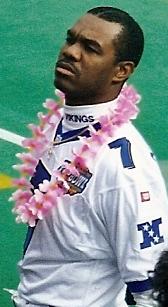
Under Campbell, the team struggled. But his time as coach saw the arrival of two future football stars: defensive end Reggie White and quarterback Randall Cunningham. From 1983 to 1985, the Eagles had losing records. Campbell was fired after the 1985 season. That same year, owner Leonard Tose had to sell the Eagles to Norman Braman and Ed Leibowitz for $65 million.
1986–1988: Buddy Ryan's Tough Team
Campbell's time ended in 1986 when Buddy Ryan became head coach. Ryan brought a tough attitude to the team. The Eagles quickly became known for their strong defense and bold personalities. Ryan released several older players, including Ron Jaworski. Randall Cunningham became the new quarterback and showed great promise, even though the team finished 5–10–1.
1987 had a player strike, which shortened the season. Substitute players played poorly. After the strike, the regular Eagles team beat Dallas 37–20. The season record was 7–8. The Eagles made the playoffs in 1988. But they lost to the Chicago Bears 20–12 in a game known as the "Fog Bowl" because of the thick fog.
1989–1990: Playoff Frustrations
The next two years also saw playoff appearances, but the team couldn't get past the first round. This was frustrating for fans because the team was considered one of the most talented in the NFL. On offense, they had quarterback Cunningham, tight end Keith Jackson, and running back Keith Byars. The defense was thought to be one of the best in league history, even though they never won a championship.
The two 1989 games against Dallas were called the Bounty Bowls. The Eagles won both easily. Coach Ryan insulted the new Cowboys coach Jimmy Johnson.
On November 12, 1990, the Eagles crushed the Washington Redskins 28–14 in a Monday Night Football game. The defense scored three of the team's four touchdowns. This game was called "the Body Bag Game" because of how physically tough the Eagles played. The Eagles injured both of Washington's quarterbacks. Unfortunately, the Redskins returned to Veterans Stadium in the first round of the playoffs and defeated the Eagles 20–6, ending their season. Buddy Ryan was fired at the end of the season. Despite his tough talk, the Eagles failed to win a playoff game in his five years as head coach.
New Coaches and Challenges (1991–1998)
In 1991, the Eagles had the best defense in the league against both running and passing. But they missed the playoffs despite a 10–6 record. This was partly because Randall Cunningham tore his ACL in Week 1. Key defensive stars included Reggie White, Jerome Brown, Clyde Simmons, and Seth Joyner.
After Ryan was fired, his offensive coordinator, Rich Kotite, became the new head coach. Even with Cunningham's injury, backup QB Jim McMahon played well. In 1992, Kotite led the Eagles back to the playoffs with an 11–5 record. They beat the New Orleans Saints 36–20 in the first round. But they lost to Dallas 34–10 the next week. After the season, Reggie White left the team. In the 1992 offseason, defensive tackle Jerome Brown died in a car crash. In 1993 and 1994, Kotite's Eagles started well but then struggled, missing the playoffs.
At this point, owner Norman Braman was not popular with fans. He sold the team to film producer and current owner Jeffrey Lurie. Lurie's first action was to fire Kotite.
Lurie chose San Francisco 49ers Defensive Coordinator Ray Rhodes as the new coach. In 1995, Rhodes's first season, the Eagles started slowly but finished 10–6 and made the playoffs. They crushed the Detroit Lions 58–37 in the first round. In the next round, against the Cowboys, starting QB Rodney Peete was injured. Randall Cunningham came in, but the Eagles lost. Cunningham retired after the season.
In 1996, the Eagles wore new, darker green uniforms. They started well but lost momentum when Peete got a season-ending knee injury. The team made the playoffs with a 10–6 record but lost early to the 49ers. Fans and media blamed expensive new players for not performing well in big games. Rhodes became stressed, and players grew tired of his coaching style. After a difficult 6–9–1 season in 1997, the team had a terrible 3–13 record in 1998, their worst ever. Attendance dropped, and the team was struggling. Lurie fired Rhodes after the disastrous season.
The Andy Reid Years (1999–2012)
1999–2002: A New Beginning
The team started to get better under new head coach Andy Reid. He drafted quarterback Donovan McNabb with the second pick in the 1999 draft. Many Eagles fans booed this choice, wanting Ricky Williams instead. But Reid's choices proved smart. With Reid leading and McNabb becoming a great player, the team improved. However, 1999 was a rebuilding year, and the Eagles only won five games.
The 2000 season saw the team go 11–5 and reach the playoffs as a wildcard. This brought back excitement to the fans. After beating the Tampa Bay Buccaneers 21–3, the Eagles lost to the Giants 20–10 in the second round.
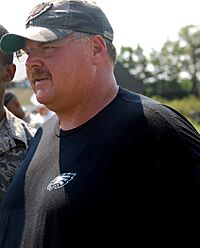
The 2000 season opener in Dallas became known as the "Pickle Juice Game." The temperature was extremely hot. An Eagles trainer had players drink pickle juice to stay hydrated. This worked, as the Cowboys lost 44–14 and had many players struggle with the heat, while the Eagles did not. This game marked the start of Philadelphia's strong performance in their division.
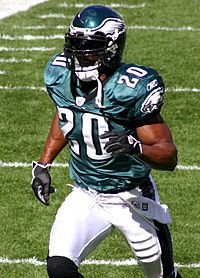
After an 11–5 record in 2001, the Eagles made the playoffs again, winning their division. They beat the Buccaneers 31–9 and then the Bears 33–19. They reached the NFC Championship game but lost to the St. Louis Rams 29–24.
Despite injuries, McNabb led the Eagles to a 12–4 season in 2002. They reached the NFC Championship again but lost at home 27–10 to the Tampa Bay Buccaneers in the last game at Veterans Stadium.
2003: A New Home
The 2003 team lost its first two games at their new home, Lincoln Financial Field. In the first game there, the Eagles lost 17–0 to the Tampa Bay Buccaneers. Despite this, the team finished 12–4 for the season. They became the first team in modern history to reach the conference championship after being shut out at home in their first game.
2004: Super Bowl Run
The Eagles brought in star wide receiver Terrell Owens on March 16, 2004. Owens would later have disagreements with McNabb and was released after the 2005 season.
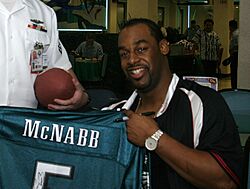
The 2004 season started great. Owens caught three touchdown passes from McNabb in the first game. Owens finished with 1,200 receiving yards and 14 touchdowns, but his season ended early with an ankle injury in December. The Eagles won 12–7 against the Dallas Cowboys, giving them home field advantage throughout the playoffs. They won their division for the fourth straight year after only eleven games. McNabb had his best season, throwing for 3,875 yards and 31 touchdowns with only eight interceptions. This made him the first quarterback in NFL history to throw 30 or more touchdowns and fewer than 10 interceptions in a season.
The Eagles started their playoff run by beating the Minnesota Vikings 27–14. This set up their fourth straight NFC Championship appearance.
Fourth Championship Appearance
On January 23, 2005, the Eagles reached their fourth straight conference championship game. Finally, the Eagles made their fans proud. They defeated Michael Vick's Atlanta Falcons 27–10. This sent them to Super Bowl XXXIX in Jacksonville, Florida, their first Super Bowl in 24 years. The city of Philadelphia celebrated wildly.
Super Bowl XXXIX
The defending champion New England Patriots were favored to win. McNabb played well with 357 yards and three touchdowns, but he also threw three interceptions. Terrell Owens returned despite his injury and caught 122 yards on 9 catches. The game was close until the fourth quarter when the Patriots took a ten-point lead. McNabb scored a touchdown, but the Eagles couldn't get close enough to win on their final drive. He was intercepted in the last seconds. The final score was 24–21, and the Patriots won their third Super Bowl.
2005: A Difficult Season
The defending NFC Champions had a tough year. The season was affected by disagreements in the locker room, partly started by Terrell Owens. The 2005 season began with a loss to the Atlanta Falcons.
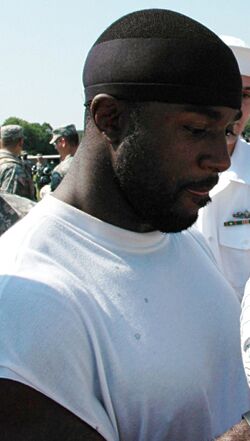
On November 4, 2005, Terrell Owens criticized the team. He was suspended indefinitely. Coach Andy Reid announced that Owens would not play for the Eagles again that year due to his behavior.
Things got worse for the Eagles. They lost to the Washington Redskins and then to the Cowboys. In the Cowboys game, Donovan McNabb suffered an injury that ended his season. Former Detroit quarterback Mike McMahon became the starter. The Eagles finished the season with a 6–10 record, missing the playoffs for the first time since 1999. They also lost all six games against their division rivals, after winning all six the previous year.
2006: Jeff Garcia Steps Up
In 2006, the Eagles started strong, winning three of their first four games. This included a big win against Terrell Owens' Cowboys, where Lito Sheppard had a game-winning interception return for a touchdown.
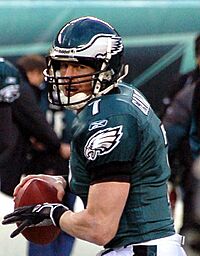
McNabb's season was going very well. But after losing to the New Orleans Saints and Tampa Bay Buccaneers, the Eagles lost McNabb to a season-ending injury for the second year in a row.
With McNabb injured, the Eagles turned to Jeff Garcia to lead the team. Many fans were not happy with this choice. The Eagles' record was 5–6, and they seemed unlikely to make the playoffs. However, Garcia led the team to an amazing five-game winning streak. This included a Christmas game in Dallas. The Eagles finished the season 10–6 and made the playoffs.
The Eagles won their first playoff game against the Giants 23–20. Their next game was a rematch against the Saints. The Eagles lost 27–24, ending their season.
2007: A Milestone Season
2007 marked the Eagles' 75th season. The Eagles drafted quarterback Kevin Kolb, hinting at a future beyond McNabb. McNabb had average performances and missed three games due to injury. The team finished with an 8–8 record and missed the playoffs by one game.
2008: A Playoff Run
The beginning of 2008 looked good for the Eagles. Donovan McNabb started well, Brian Westbrook scored many touchdowns, and rookie receiver DeSean Jackson became important. However, the Eagles tied the Bengals 13–13 in Week 10. McNabb later caused controversy by saying he didn't know an NFL game could end in a tie.
Against Baltimore, McNabb was benched at halftime due to poor play. His backup, Kevin Kolb, threw an interception that was returned for a record 107-yard touchdown.
For their Thanksgiving night game against the Arizona Cardinals, McNabb was chosen to start again. He surprised everyone, leading the Eagles to a big 48–21 win with four touchdowns. The Eagles then won three more games. Despite a later loss, the Eagles made the playoffs by beating the Dallas Cowboys 44–6 in the final regular season game.
The Eagles defeated the Minnesota Vikings 26–14 in the first round of the playoffs. They then beat their division rival and defending Super Bowl champions, the New York Giants 23–11, to reach their fifth NFC Championship game in nine years. An all-Pennsylvania Super Bowl seemed possible, but the Eagles lost 32–25 to the Arizona Cardinals.
2009: Michael Vick Joins
In August, the team signed former Falcons quarterback Michael Vick. He had recently been released from prison. In the first game, McNabb broke a rib and missed two games. Kevin Kolb took his place. After a loss to New Orleans, the Eagles beat Kansas City. McNabb returned, and Vick also started playing.
After a loss in Oakland, the Eagles beat the Redskins 27–17. Running back Brian Westbrook suffered a severe concussion in this game. He returned later but had another concussion. Philadelphia then won five straight games, making the playoffs. However, the season ended with two losses to a strong Cowboys team, including a playoff loss.
2010: Vick Takes Over
On February 23, 2010, the Eagles released running back Brian Westbrook, their all-time leader in yards from scrimmage. A bigger surprise came when the team traded quarterback Donovan McNabb to their division rival Washington Redskins. Kevin Kolb was named the new starting quarterback.
Kolb's first game was tough. He suffered a concussion and Michael Vick replaced him. The Packers won 27–20. After Kolb recovered, Andy Reid named Vick the starting quarterback instead. Vick led the team to impressive wins against the Detroit Lions and Jaguars.
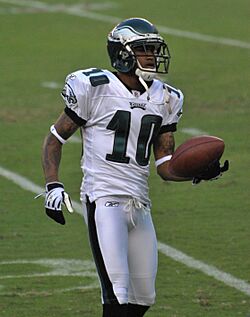
In Week 4, McNabb returned to Philadelphia with the Redskins. Vick was injured during the game, and Kolb came in. The Redskins won 16–12. Vick was diagnosed with cracked cartilage and missed at least one game.
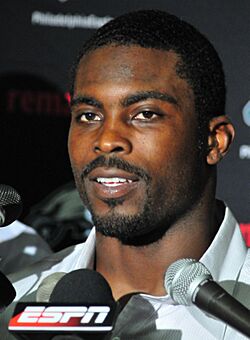
Kolb led the team to a win against the 49ers. The Eagles then beat the Falcons 31–17. After a loss to Tennessee, Vick returned as starter. He led the Eagles to a 27–24 win over the Colts. Then, in a Monday Night Football game against Washington, the Eagles crushed the Redskins 59–28. Michael Vick had an amazing performance with six touchdowns.
The Eagles lost to the Bears but rebounded with a win against Houston. In Week 14, the Eagles beat the Dallas Cowboys 30–27, eliminating Dallas from playoff contention.
In Week 15, the Eagles had a shocking comeback win against the New York by overcoming a 21-point deficit. In the final seconds, DeSean Jackson returned a punt 65 yards for a touchdown to win 38–31. This became known as the Miracle at the New Meadowlands. After winning their division, the Eagles lost to the Vikings and then to Dallas. They hosted the Packers in the playoffs but lost 21–16.
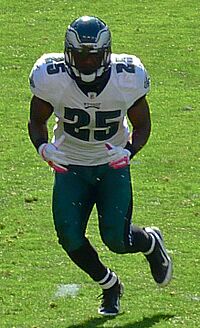
2011: The "Dream Team"
The 2011 offseason had a lockout, which stopped practices and trades. After the lockout, the Eagles signed many high-profile free agents. These included cornerback Nnamdi Asomugha and running back Ronnie Brown. Kevin Kolb was traded to Arizona, and former Titans quarterback Vince Young joined the team. Young created a lot of excitement by calling the Eagles the "Dream Team."
Although the Eagles won their 2011 opener, the "Dream Team" didn't live up to expectations. Michael Vick suffered injuries and turnovers. The Eagles lost four straight games. With Vince Young playing, the Eagles beat the Washington Redskins. Vick returned later and helped crush the Dallas Cowboys 34–7. After more losses, the Eagles beat the New York Giants and then won their final four games to finish 8–8. They lost to the New England Patriots and Seattle Seahawks before their winning streak.
2012: End of the Reid Era
The Eagles started 2012 with high hopes after finishing the previous season strong. They started 3–1, including a win over the Baltimore Ravens. But these hopes ended quickly as the team lost 11 of their next 12 games, finishing 4–12. This was their worst record since 1998. After a Michael Vick injury, Nick Foles stepped in as quarterback. In Week 14, Foles led a game-winning touchdown drive against the Tampa Bay Buccaneers, throwing a touchdown with one second left. The Eagles then fired Andy Reid, who was the longest-serving and winningest coach in team history. Reid later became head coach of the Kansas City Chiefs.
The Chip Kelly Era (2013–2015)
2013: Immediate Success
After Andy Reid was fired, Chip Kelly became the Eagles head coach on January 16, 2013. Kelly was known for his fast-paced football style from his time at the University of Oregon.
In his first NFL season, Kelly led the Eagles to a 10–6 record and an NFC East championship. He was only the second coach in league history to win a division title in his first NFL season. During the season, Michael Vick got injured, and backup Nick Foles took over. Foles became a surprise star, finishing the season with 27 touchdowns and only 2 interceptions. In one game against the Oakland Raiders, he threw for 7 touchdowns, tying an NFL record.
The Eagles set many team records that year, including points (442), total yards (6,676), and touchdowns (53). Running back LeSean McCoy set franchise records for rushing yards and scrimmage yards. In Week 17, the Eagles and Cowboys played a winner-takes-all game for the division title. The Eagles won after cornerback Brandon Boykin intercepted a pass in the final minutes. The Eagles made the playoffs for the first time since 2010. However, they lost to the New Orleans Saints in the first round on a game-winning field goal as time expired.
2014: Strong Start, Tough Finish
In 2014, there were high expectations for Chip Kelly's second season. The Eagles started strong with a 6–2 record. However, Nick Foles broke his collarbone in Week 9. Mark Sanchez took over for the rest of the season. The team's record fell from 9–3 to 10–6, and they missed the playoffs. Even though they had the sixth-best record in the NFC, the Carolina Panthers won their division with a worse record, taking a playoff spot.
2015: End of Chip Kelly Era
For the 2015 season, Chip Kelly was given full control of the team. He made many changes to the roster, trading or releasing popular players like LeSean McCoy, Jeremy Maclin, and Nick Foles. This upset many Eagles fans. The new quarterback was Sam Bradford. Kelly also signed DeMarco Murray, the previous season's rushing leader, from the rival Dallas Cowboys.
The new roster didn't work out, and the Eagles finished 7–9, missing the playoffs. This was partly due to an injury to Sam Bradford in Week 9. Mark Sanchez took his place, but the offense struggled. Bradford returned in Week 12 and led the team to a win against the New England Patriots. Kelly was fired as head coach with one game left in the season.
The Doug Pederson Era (2016–2020)
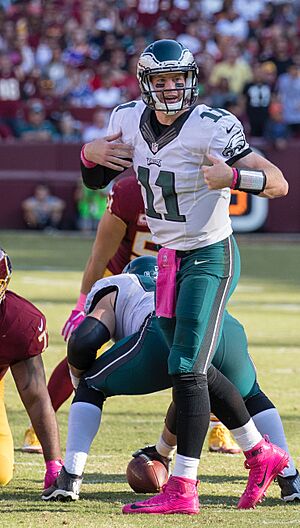
2016: Carson Wentz and Doug Pederson's First Year
After Chip Kelly, Doug Pederson was announced as head coach on January 18, 2016. This was his first NFL head coaching job. The Eagles traded up in the draft to pick quarterback Carson Wentz second overall in the 2016 NFL Draft. The season started well, with the Eagles winning their first three games. Doug Pederson became the first coach in franchise history to win his first three games. However, the team struggled later in the season, finishing 7–9 and missing the playoffs.
2017: First Super Bowl Championship
During the offseason, the team made many changes to help Wentz, especially at receiver and running back. These changes worked. The Eagles soared to the top of the NFL with a 13–3 record. This gave them their first NFC East Championship since 2013 and a first-round bye in the playoffs, their first since 2004. Carson Wentz improved greatly, throwing for 33 touchdowns and only 7 interceptions. However, his amazing season ended in Week 14 when he tore his ACL against the Los Angeles Rams.
Nick Foles, who had returned to the Eagles, took over as quarterback. His performances at the end of the regular season made the team underdogs in the playoffs, even though they were the top seed. The Eagles beat the Atlanta Falcons 15–10 in the divisional round. This was their first playoff win since 2008. The game ended with a key defensive stop by the Eagles at their goal line. The Eagles then faced the Minnesota Vikings in the NFC Championship. The Eagles dominated the Vikings, winning 38–7. This sent them to the Super Bowl for the first time since 2004. The Eagles faced Tom Brady and the New England Patriots in a rematch of Super Bowl XXXIX at Super Bowl LII. The Eagles won the game 41–33, giving them their first Super Bowl Championship and their first championship since 1960. Nick Foles was named Super Bowl MVP.
2018: Trying to Repeat
The Eagles hoped to win another Super Bowl in 2018. But many injuries affected the team, including quarterback Carson Wentz, who was still recovering from his ACL injury. Nick Foles started the season and helped win the first game against the Atlanta Falcons 18–12. The season opener ended similarly to the previous year's playoff game, with an incomplete pass in the end zone.
Throughout the 2018 season, many injuries affected the team, especially in their defensive backfield. The Eagles started with a 4–6 record, making their playoff chances look small. But they won 5 of their last 6 games, including upset victories over the Rams and Texans. They finished 9–7 and made the playoffs as the sixth seed. Carson Wentz was diagnosed with a stress fracture in his back after Week 14, and Nick Foles filled in again. The Eagles' win against the Texans in Week 16 was close, with Jake Elliott making a field goal to win the game in the final seconds.
In the Wild Card game against the Chicago Bears, Nick Foles threw 2 touchdowns and 2 interceptions in a 16–15 win. Bears kicker Cody Parkey missed a game-winning field goal that hit the upright and crossbar. This sent the Eagles to a NFC Divisional matchup against the New Orleans Saints. The Eagles led the Saints 14–0 in the first quarter. However, the offense couldn't score any more points, and the Eagles lost 20–14. Their chance to defend their Super Bowl championship ended when a pass went through Alshon Jeffery’s hands and was intercepted by the Saints.
2019: Third Playoff Trip in a Row
In the offseason, Nick Foles left Philadelphia to sign with the Jacksonville Jaguars. The Eagles also traded Michael Bennett. A notable addition was the return of DeSean Jackson in a trade. Other new players included defensive tackle Malik Jackson and running back Jordan Howard.
The Eagles started well with a Week 1 win against the Washington Redskins, where DeSean Jackson caught two long touchdowns. However, the Eagles lost their next two games due to major injuries. They beat the undefeated Green Bay Packers in Week 4 and the New York Jets the next week. After losing to the Minnesota Vikings and in Dallas, the Eagles won two straight games. After their bye week, they played the New England Patriots for the first time since Super Bowl LII. The Eagles lost 17–10 after blowing an early lead.
The next week, the Eagles lost to the Seattle Seahawks at home. The Eagles then lost to the Miami Dolphins in Week 13. In the next two weeks, the Eagles beat the Giants in overtime and then the Redskins. In Week 16, the Eagles played the Cowboys in Philadelphia. The Eagles won 17–9, preventing the Cowboys from winning the division.
Heading into Week 17, the Eagles needed a win against the Giants or a Cowboys loss to win the NFC East. The Eagles won against the Giants 34–17, with Boston Scott scoring three touchdowns. The Eagles won the NFC East with a 9–7 record.
Carson Wentz started his first playoff game at home against the Seahawks. In the first quarter, Wentz suffered a concussion and was sidelined. Backup Josh McCown stepped in. The Eagles lost 9–17, failing to score a touchdown.
2020: End of an Era
The 2020 season started without fans at home games due to COVID precautions. The team added Jalen Hurts in the draft. The team dealt with many injuries and poor quarterback play. The Eagles lost their first game to the Washington Football Team, their first loss to Washington since 2016. They then lost to the Rams. In Week 3, the Eagles tied the Bengals. They won against the 49ers but lost the next two games.
In Week 7, the Eagles came back from a 21–10 deficit to beat the Giants 22–21. In Week 8, they defeated the Cowboys at home 23–9. However, after their bye week, the Eagles struggled, winning only one of their last 8 games. Their only win was against the New Orleans Saints in Week 14, 24–21, when Jalen Hurts took over for Carson Wentz as starting quarterback. Wentz was benched in Week 13. The Eagles were eliminated from playoff contention after a Week 16 loss to the Cowboys. They finished the season 4–11–1, their worst record since 2012. On January 11, 2021, Pederson was fired as head coach. On March 17, 2021, Wentz was traded to the Indianapolis Colts.
A New Era (2021-present)
A New Quarterback and the Playoffs (2021)
The Eagles began their 2021 season with Jalen Hurts as their new starting quarterback. Nick Sirianni, who was previously an offensive coordinator for the Indianapolis Colts, became the Eagles' new head coach. The team started with a 3–6 record. However, they improved by focusing more on running the ball. They finished the season 9–8 and reached the playoffs for the fourth time in five years. But they lost to the Tampa Bay Buccaneers 31–15 in the NFC Wild Card round.
A. J. Brown Era (2022)
In the 2022 draft, the Eagles traded with the Titans to get star wide receiver A. J. Brown. The Eagles had a great regular season, finishing 14–3 and making the playoffs again. In the NFC Divisional round, they beat the New York Giants 38–7. They then defeated the San Francisco 49ers 31–7 in the NFC Championship Game, earning a trip to the Super Bowl. In the Super Bowl, the Eagles lost to the Kansas City Chiefs 38–35.
Images for kids
-
Eagles' defensive tackle Antonio Dixon tackles Chris Johnson of the Tennessee Titans, October 24, 2010.
 | Leon Lynch |
 | Milton P. Webster |
 | Ferdinand Smith |


